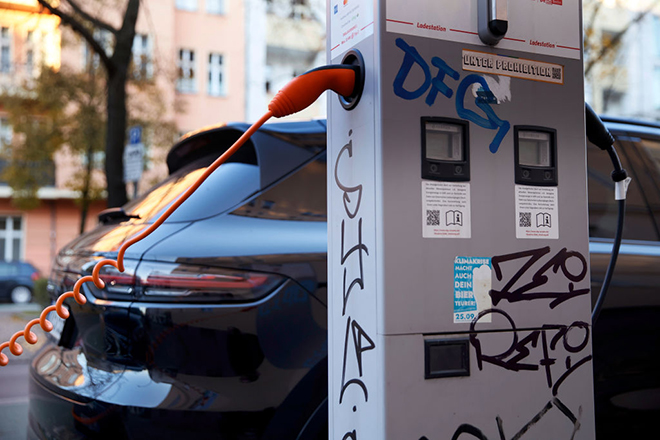S&P Global Offerings
Featured Topics
Featured Products
Events
S&P Global Offerings
Featured Topics
Featured Products
Events
S&P Global Offerings
Featured Topics
Featured Products
Events
Banking & Capital Markets
Economy & Finance
Energy Transition & Sustainability
Technology & Innovation
Podcasts & Newsletters
Banking & Capital Markets
Economy & Finance
Energy Transition & Sustainability
Technology & Innovation
Podcasts & Newsletters
S&P Global Offerings
Featured Topics
Featured Products
Events
10 Nov, 2021

By Camilla Naschert
 |
|
An electric Porsche charges at a public charging station in Berlin. Growing global consensus behind electric |
To read all our coverage of COP26, click here
A host of countries, cities and companies committed Nov. 10 to phasing out the sale of fossil fuel-powered cars and vans by 2040, and even earlier in some markets, in a declaration at the COP26 climate conference in Glasgow, Scotland.
The pledge includes countries like the U.K. and Canada while corporate signatories include vehicle manufacturers Ford Motor Co. and General Motors Co., which will only sell zero-emission vehicles by 2035 or earlier. Yet, the world's largest carmaking economies, including China, the U.S., Japan and Germany, are absent from the commitment, as are major automakers Volkswagen AG, Toyota Motor Corp. and Hyundai Corp.
Cities signing up include many from nations that are not signatories, including New York City, Los Angeles and Rome, which have pledged to shift to zero-emission fleets by 2035. Business fleet owners such as Uber Technologies Inc., IKEA AB and BT Group PLC will aim to make the switch by 2030 or earlier.
"The changes we have seen in the automotive industry would have looked remote when we took the [COP26] presidency," Trudy Harrison, U.K. parliamentary under-secretary of state for transport, said in Glasgow.
Today, one in five car sales are made in countries with a phaseout date for polluting vehicles. "There are clear signs that cars have turned a corner," Harrison said.
Investors with large holdings in car manufacturers have also joined the pledge, promising proactive engagement and escalation of issues with the companies.
Technology debate is over
While the scope of zero-emission vehicles goes beyond electric cars and includes fuel cells and other technologies, the debate around frontrunner technologies is over, according to Håkan Samuelsson, CEO of Swedish carmaker AB Volvo, speaking on a panel at COP26.
"The grass is not greener on the other side, it is already very green on this side and we should start electrifying," Samuelsson said.
Volvo has said it will not sell internal combustion engine vehicles after 2030. It is joined in the declaration by Ford, GM, Mercedes-Benz AG and Jaguar Land Rover Ltd., among others.
According to Samuelsson, concerns over electric vehicle charging infrastructure, which remains a prohibiting factor to adoption for many drivers, are resolvable. "I'm not too nervous about that," he said, adding that he expects supply to ramp up alongside increasing uptake of EVs.
Rather, the CEO sees a need for progress in the primary energy supply that fleets will be drawing from. "The primary energy needs to be fossil-free," he said. Instead, countries across the world, including the U.S. and Germany, are rolling out EVs while coal continues to play a key role in the power mix.
"We will also have to start thinking about the primary energy in the supply chain," Samuelsson added. Volvo is buying initial quantities of so-called green steel, made with the electrification of heat generation by Swedish steel firm SSAB AB. Green steel is picking up momentum as a hydrogen market takes shape, but the method remains in an expensive pioneering phase.
Battery production will also need to be fossil-free, or else cars will build in more emissions through their supply chain than they avoid over their lifetime, Samuelsson noted.
Equality in the transition
The list of signatories to the declaration skews to wealthy developed markets and companies in the Global North, something the signatories acknowledge. International support for developing countries through technical assistance, finance and capacity building is promised "so that no country and community is left behind."
Nigel Topping, the U.K.'s high-level champion for climate action at COP26, said that polluting petrol and diesel cars phased out in developed nations ought not be exported, or "dumped" into poorer nations, shifting pollution and emissions overseas.
